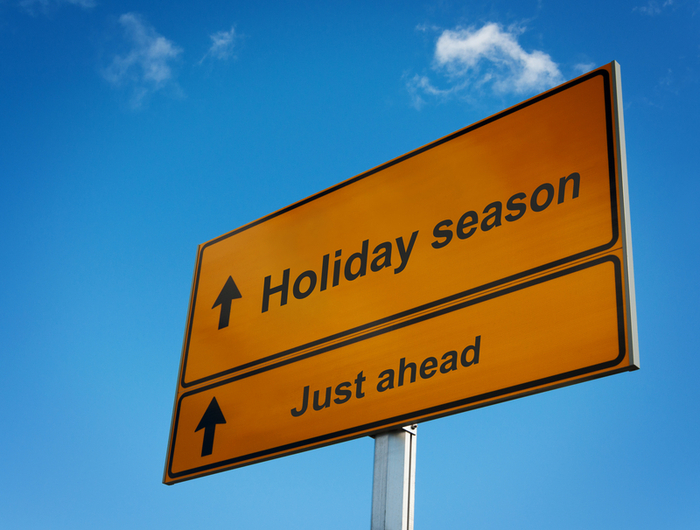- Calls to this hotline are currently being directed to Within Health, Fay or Eating Disorder Solutions
- Representatives are standing by 24/7 to help answer your questions
- All calls are confidential and HIPAA compliant
- There is no obligation or cost to call
- Eating Disorder Hope does not receive any commissions or fees dependent upon which provider you select
- Additional treatment providers are located on our directory or samhsa.gov
Celebrating the Holidays Without Eating Disorder Relapse

It’s no secret that the holiday season can be a stressful time. Family gatherings, workplace demands, gift-buying responsibilities, and pervasive, not-so-subtle pressure to be nothing but joyful are among the many reasons why November and December are difficult months for many people.
For example, according to a survey conducted by the National Alliance on Mental Illness (NAMI), 64% of people who have a mental health disorder say that they experience more severe symptoms during the holiday season [1].
With so many holiday-related events involving food and large numbers of people, this time of year can be especially challenging for those who are recovering from eating disorders.
A 2011 study in the International Journal of Eating Disorders noted that “work and social stress represent significant warning signs for triggering relapse” among women who have achieved remission from certain types of eating disorders [2].
Here are five tips to help you celebrate the holidays without undermining your recovery from an eating disorder.
Know Your Triggers
Learning about triggers is an important part of eating disorder treatment. When you know what types of experiences are most likely to threaten your recovery, you can avoid them when possible and develop strategies for responding in a healthy manner when confronted with them.
Eating disorders impact people in different ways, so there isn’t one comprehensive list of triggers everyone is affected by. However, in general, common eating disorder triggers include:
- Having conversations about dieting, weight, body shape, or related topics
- Being negatively judged for your thoughts, opinions, or behaviors
- Being in the presence of certain types of food
- Seeing media images that glorify certain body types
- Experiencing financial difficulties
- Eating in the presence of many people
- Losing your job or ending a relationship
- Being subjected to social pressure
- Feeling ignored or ostracized
Recognizing and knowing how to respond to triggers are vital skills every day of the year. During the holidays, your understanding of your triggers can help you navigate the challenges of the season while protecting your recovery.
Make a Plan
The good news about holiday-related stress is that it often follows a predictable pattern. You can look up the dates of Thanksgiving, Hannukah, Christmas, and Kwanzaa well in advance, and the events and responsibilities associated with these holidays remain relatively consistent from year to year.
This predictability can be a tremendous advantage in terms of maintaining your recovery from an eating disorder.
First, the more you can do to limit the likelihood of unwelcome surprises, the better prepared you’ll be to safeguard your health throughout the holiday season.
Second, when you know that an upcoming event might be particularly problematic for you, you can take steps to respond in the healthiest manner. This might include avoiding certain people or circumstances at the event, limiting your participation, bringing a friend for support, or simply declining the invitation. The work you put into understanding your triggers can be an essential part of the planning process.
Also, you don’t have to limit your planning efforts to individual events. Keep your eye on your calendar to make sure that you’re not overburdening yourself with too many holiday-related responsibilities. Also, be sure to give yourself adequate time to rest and recharge.
Manage Your Expectations
If you spend any time watching TV between Halloween and New Year’s Day, you will likely be bombarded with messages that this is truly the happiest time of the year. Many films, television shows, and commercials reinforce the myth that if you can’t find happiness during the holidays, you’re either inherently flawed or just not trying hard enough.
Back here in the real world, we know that any gathering with friends and family members has the potential for both joy and disappointment. We also realize that interpersonal conflicts, financial worries, health concerns, and other sources of stress don’t simply disappear during the holiday season.
There’s a pretty good chance that your holiday experiences won’t be perfect. On the other hand, they’re also unlikely to be a complete disaster. So why would you waste your time creating unrealistic expectations or steeling yourself for the absolute worst?
Instead, as you work on the plan we discussed in the previous section, be realistic about both the joy you may experience and the challenges you may encounter. Approaching any event with properly calibrated expectations is an excellent technique to protect yourself from disappointment while also opening yourself to the potential for positive outcomes.
Don’t Be Afraid to Say No
Establishing healthy boundaries is an essential recovery skill. In terms of the holidays, this may include politely declining invitations when your schedule is becoming too full or when participating in an event might jeopardize your recovery.
Saying “no” doesn’t mean that you are unappreciative or antisocial. It simply means that you respect yourself and are committed to taking the necessary steps to maintain your health. Depending on your relationship with the person who invites you, you may tell them why you think it’s better for you to stay home, or you can simply say that you regretfully will be unable to attend.
Anyone who truly values you will understand. And anyone who gives you a hard time about declining may not be someone you want to spend additional time with anyway.

Get Help When You Need It
When you’re working to maintain your recovery from an eating disorder, help can take many forms.
In some cases, an honest conversation with a member of your personal support network can provide the ideal amount of assistance. In other cases, the best course of action might be to attend a support group meeting, schedule an extra session with a therapist or counselor, or enter a treatment center.
If you’re concerned that a specific holiday-related event may threaten your recovery, getting help may involve talking things through ahead of time with a close friend or trusted family member. If possible, you may want to invite this person to attend the event with you — or at least make sure that they will be available to talk on the phone or exchange text messages during the event.
If you are a member of a support group or are under the care of a therapist or counselor, these can also be excellent sources of help to prepare for the event and to process your experience afterward.
What’s most important is understanding that you are not alone and that asking for help is not a sign of weakness or failure. Realizing that you’re struggling and getting the right type of assistance are evidence that you are taking your recovery seriously and that you’re committed to doing whatever you need to do to protect your health.
During the holidays or at any other time of year, proactive self-care may be the best gift you can give yourself.
References
- NAMI. (2014, November 19). Mental Health and the Holiday Blues. National Alliance on Mental Illness. Retrieved November 15, 2021, from https://www.nami.org/Press-Media/Press-Releases/2014/Mental-health-and-the-holiday-blues.
- Grilo, C. M., Pagano, M. E., Stout, R. L., Markowitz, J. C., Ansell, E. B., Pinto, A., Zanarini, M. C., Yen, S., & Skodol, A. E. (2012, March). Stressful life events predict eating disorder relapse following remission: Six-year prospective outcomes. The International journal of eating disorders. Retrieved November 15, 2021, from https://www.ncbi.nlm.nih.gov/pmc/articles/PMC3275672/.
About Timberline Knolls
Timberline Knolls is a residential treatment center located on 43 beautiful acres just outside Chicago.
The opinions and views of our guest contributors are shared to provide a broad perspective of eating disorders. These are not necessarily the views of Eating Disorder Hope but an effort to offer a discussion of various issues by different concerned individuals.
We at Eating Disorder Hope understand that eating disorders result from a combination of environmental and genetic factors. If you or a loved one are suffering from an eating disorder, please know that there is hope for you, and seek immediate professional help.
Published on December 8, 2021. Published on EatingDisorderHope.com
Reviewed & Approved on December 8, 2021 by Jacquelyn Ekern, MS, LPC

The EatingDisorderHope.com editorial team comprises experienced writers, editors, and medical reviewers specializing in eating disorders, treatment, and mental and behavioral health.

